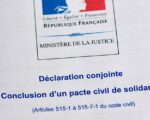>> Federal Judge Overturns Kansas Ban On Same-Sex Marriage
« Cette interdiction viole le 14e amendement de la Constitution des États-Unis, qui protège le droit fondamental de se marier, de fonder une famille et d’élever des enfants en profitant de la pleine protection de la loi sur le mariage d’un État. »
Dans son arrêt, le juge Daniel Crabtree, nommé par le président Obama, a estimé que « devoir juger » la constitutionnalité des lois adoptées démocratiquement était l’une des taches les plus difficiles et délicates pour un tribunal fédéral. Mais, puisqu’il y a un précédent, et c’est essentiel dans l’application de la loi, et que la Cour suprême ou la Cour d’Appel du dixième circuit, à laquelle le Kansas est notamment rattaché, a établi une « règle claire », « la Cour fédéral doit suivre. »
Au début du mois d’octobre, la Cour suprême des États-Unis avait en effet annoncé son refus d’examiner la question du mariage entre personnes de même sexe, maintenant de fait dans certains états, les décisions de tribunaux de rang inférieur, qui y ont invalidé l’interdiction des mariages homosexuels en estimant que l’interdiction était anticonstitutionnelle. Les couples pouvaient donc s’y marier, en attendant qu’elle se prononce sur le fond. Et, ce devrait être également le cas, dès la semaine prochaine, pour les conjoints homosexuels dans le Kansas, qui deviendrait ainsi le 33e État américain à adopter l’égalité des droits, à moins que le procureur général, Derek Schmidt, ne décide finalement de faire appel.
Terrence Katchadourian
@stop_homophobie
>> Marriage equality wasn’t going to let the midterm elections have all the attention.
Saying that the state’s ban on marriage between people of the same sex violates the 14th Amendment, a federal judge in Kansas City is ordering Kansas to stop enforcing its ban. Today’s injunction takes effect in one week, depending on whether the state appeals.
Kansas has attempted to sustain its ban on gay marriage despite the Supreme Court’s denial of any hearings from states that were attempting to appeal rulings that overturned their prohibitions.
In today’s ruling, U.S. District Court Judge Daniel Crabtree cited a 10th Circuit Court appeals court decision, Kitchen v. Herbert, which states that the 14th Amendment « protects the fundamental right to marry, establish a family, raise children, and enjoy the full protections of a state’s marital laws. »
Crabtree’s ruling came in a case filed by the ACLU in Kansas on behalf of couples whose requests for marriage licenses were denied in at least two Kansas counties.
The decision marks the latest fallout from the U.S. Supreme Court’s move last month to let stand three appeals court rulings in favor of marriage equality. One of those courts – the 10th Circuit – has appellate jurisdiction over Kansas, hence U.S. District Judge Daniel Crabtree’s decision Tuesday to overturn the state’s ban.
“Judging the constitutionality of democratically enacted laws is among ‘the gravest and most delicate’ enterprises a federal court ever undertakes,” wrote Crabtree, a President Obama appointee, in his 38-page opinion. “But just as surely, following precedent is a core component of the rule of law. When the Supreme Court or the Tenth Circuit has established a clear rule of law, our Court must follow it.”
In two separate rulings earlier this year, the 10th Circuit Court of Appeals struck down same-sex marriage bans in Oklahoma and Utah. Those rulings became final last month when the Supreme Court justices declined to review either case, as well as similar cases out of the 4th and 7th Circuits. Because of that action, marriage equality became the law of the land throughout the states where those cases originated – Indiana, Oklahoma, Utah, Virginia and Wisconsin – as well as throughout the other states with same-sex marriage bans that belong to the same circuits – Colorado, Kansas, North Carolina, South Carolina, West Virginia and Wyoming.
A day after the Supreme Court’s move, another federal appeals court — the 9th Circuit — struck down marriage laws in Idaho and Nevada, essentially making bans in three other states bound to that appellate ruling impossible to defend. In two days, marriage equality looked poised to jump from 19 states plus the District of Columbia to 35.
Some elected officials have vowed to continue defending their bans, however, leaving marriage equality’s march to 35 still incomplete. Kansas Attorney General Derek Schmidt has until next week to decide whether he’ll appeal Crabtree’s ruling, which is on hold until then. If he chooses not to appeal, Kansas will become the 33rd state where gay and lesbian couples can legally wed.


















